|
How to Campaign
for
HUMAN RIGHTS
IHRC Student
Workshop, 27 Oct 2002
Recently the Islamic
Human Rights Commission held a workshop on how to campaign for
human rights. It was primarily aimed at university students to provide
them with knowledge of the plight of Muslims around the world and
to equip them with skills on how to campaign for justice and human
rights.
Here we present some of the seminars. There is something
here for everyone to learn from.
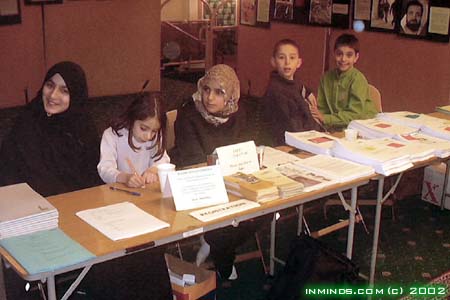
No one is too young to stand for justice!
Some of IHRCs young volunteers manning the registration desk
 |
Introduction
to IHRC
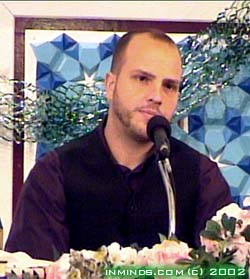
by
Demir Mahmutcehajic (IHRC Founder)
"... I remember
one incident that happened in the Bosnian war after the fall
of Srebrinica. It was related later on in the newspapers that
a young [Bosnian] soldier, 21 years old, who stayed under
the siege of Srebrinica all through the war. When Srebrinica
fell [to the Serbs] he was detached from his unit. He was
lost in the forest for three weeks he was going here and there
- he couldn't find his way. He was bleeding, he was wounded,
he was hungry and he became desperate. He was walking in one
direction and then he stayed there.
Later on when the
Bosnian soldiers found him, they found him dead in a small
hiding place. And on a wall he had written in blood "Oh
Allah, forgive me". He took his own life, he took his
own life because he couldn't bear any more because he had
seen such horrible things. He knew taking his own life was
wrong, he knew that what he was doing is wrong and he asked
for forgiveness. He just couldn't cope anymore.
The irony of this
incident is that the friendly lines were only 50 metres away!
He only needed to go 50 metres more.
Why is this so important
to me and why should it be important to all of us?
Its the message that
we should never give up - we should absolutely never give
up. It doesn't matter how hard it is, it doesn't matter how
few in numbers we are. If we are convinced that we are on
the right path, we are doing the right thing, we should never
give up. If the whole world turns against us, if the whole
world calls us terrorist and what ever terms they use, we
know that we are not, we know that we are on the right path,
we know that we are campaigning for the justice, for the freedom,
for the rights of people everybody else oppressed..."
|
 |
Ethics
of Campaigning for Human Rights
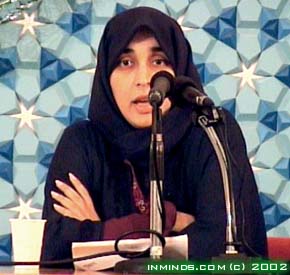
by Sister
Arzu Merali
(Director of Research, IHRC)
"... When Muslims
talk about Human Rights there is always a group of Muslims
who will say that 'you are just copying the West' and there
is a group of people in the West that say 'oh at last you
are catching up with us - your learning how to actually respect
peoples rights'. Well none of that is true because if we look
back at Islamic sources we know that we can actually set the
agenda - we have a concept of rights which is for everyone.
Now I'm not an alim but ulema will explain that justice is
for all. The ayat that I have here, it says very clearly that
when you judge between people you judge with justice, not
just when you judge between Muslims and anybody else. [ Surah
al-Nisa, verse 58].
Going back to the example
of CampX-Ray [the treatment of prisoners held without charge
and without evidence] and an example of an Islamic source
[for comparison]:
When Harzat Ali [the
leader of the Muslim Ummah around 1400 years ago] was struck
with a sword when he was praying in the Mosque at Kufa, he
called out to the people who were apprehending the person
who had struck him. Now he didn't say "get that guy"
or start talking about the fact that he was dying or anything.
What he actually said was "do not tie the hands of this
man so tight that it hurts him".
Now subsequent to
this, because Hazrat Ali died after two days - he didn't die
straight away, during that period of time he also sent provisions
to the person who had been detained- the person who had struck
him, in the prison because he had nothing.
Further he also gave
advise to the people who'd be trying him that he should be
tried fairly and if he was found guilty then he should be
executed in a humane way - there shouldn't be any kind of
vengeance taken against him. Now this was about a man that
everybody had seen what he had done, there were so many witnesses
that it was beyond dispute that this man had killed or struck
the fatal blow..."
|
 |
International
Campaigning:
Case Study of Palestine
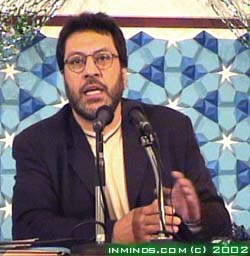
by Massoud
Shadjareh (Chairman of IHRC)
"What is it
that we want to achieve for Palestine?
There is no point
of us having elaborate campaigns without being focused on
what is it that we want to achieve. Do we want to achieve
a reduction of children which are dying everyday in Palestine?
Do we want a reduction of lets say destruction of homes -
instead of a hundred every three months we want it reduced
to twenty? Is it that we want to just want an end to all killing
and all destruction? Or do we want to remove this oppressive
regime of zionism? Or is it another sort of extreme, that
we want to push all the Jews in to the sea as some claim we
as Muslims want to do? Which one of these is it?
Because unless our
own community is actually focused on why we want to campaign
and what we want to achieve, then we are not really going
to be able to benefit from the fruit of our work because we
are not focused.
I put it to you that two-state
solution is no solution what so ever. Many of our own brothers
are worried to speak out against a two-state solution because
the international community has put a situation saying that
if Palestinians have got the right of a homeland, which they
haven't got, then Israelis should have a right to a homeland
as well - the Jews. Now the fact of the matter is that what
we are opposing is Zionism Zionism is a racist ideology, we
need to be very familiar with its nature and its effect.
The reality is that under
zionist state, every Jew around the world has got the automatic
right of becoming a citizen and going to Israel. According
to the constitution, even if a Jewish person who is known
to be going to destroy the state of Israel cannot be stopped
from entering the country and taking residency, and no one
else [non-Jew] has the right to go. One of these anti-Zionist
Rabbis once told me that probably the solution is that we
get all of the Palestinians to go and say that they all become
Jews and they all move back to their homeland and take residency
and then revert back to Islam afterwards!
The fact is that if we
don't destroy this concept of racist ideology in the region,
then there will be no hope, no solution. I put it to you that
the situation in Palestine is not much different that the
situation as it was in South Africa. Those of us that were
campaigning against apartheid in South Africa were very clearly
focused that we cannot accept even 1% of South African land
to be under control of the apartheid regime because if the
apartheid regime is given any legitimacy in the area then
there will be no peace and future for the whole of South Africa.
And indeed this is the same situation for Israel. We need
to campaign for the destruction of Zionism and the return
of all the Palestinians and their offspring back in to Palestine.
And let them - all of them, decide what sort of future they
want to have for themselves.
Two-state solution, do
you know what it means?
Imagine that somebody comes
into your home and pushes you into the box room (small bedroom)
and saying that you can only live there. You have no right
on turning the light on or off unless we allow you. You have
no right on leaving your home without our permission, and
every once in a while we just wont give you any permission
to move for months out of your room even if you are hungry,
even if your child is starving.
And then the international
community and everybody else comes and says the solution for
this is quiet clear - we just give a box room and another
bedroom, and the rest of the house is still controlled by
the zionists [two-state solution]. Those who have taken over,
they will still have control of telling you when to go in
and when not to go in, when to turn your light on and when
not to turn your light on, how to use your utilities, when
to put a shelf up in your room or not - you need to get their
permission. And they say thats the solution! This is as ridiculous
as the concept of the two-state solution.
I put it to you that anyone
who's got any sense of justice, any sense of fair play, any
sense of vision of what could be a solution for Palestine
cannot accept to have Zionism and the supremacy of a racist
ideology like that. That is what we need to be focusing on..."
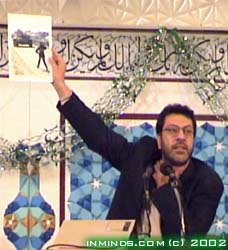
"We have all
seen this photo. This is brother Farish Odeh, for eleven days
this young boy dressed up in his best cloths and went in front
of the tank, and threw stones at the tank. For eleven days,
every day he did that, until he became shaheed [martyr]. The
least we can do is to actually model and follow on his example.
Some people say that writing a couple of letters - it has
got no impact, well tell this young man who threw stones at
the tank. And believe me he has made an impact on the hearts
and souls of every person who stands up for justice..."
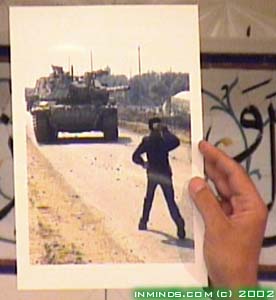
Brave Farish Odeh - an example to follow
|
 |
Thematic
Campaigning: Campaigning for Prisoners of Faith
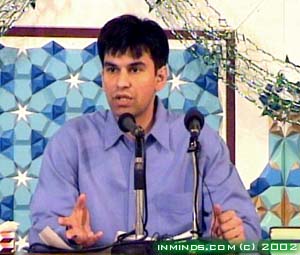
by
Reza Kazim (IHRC)
"We have often
been asked the questions [regarding letter writing]:
What difference
will one letter make?
I remember reading
of the time when the king had created this huge fire to burn
Prophet Ibrahim in and there was this little frog who would
get some water from a pond and go and put it on the fire.
The rest of the community of frogs started laughing at him:
"What are you
going? Do you really think that you are going to put out a
fire by a mouth full of water?"
And the reply was
"Its not whether I put out the fire that I'll be asked,
its whether I tried to actually put out the fire".
I think that a very
strong message for us to take.
Does the actual
letter writing campaign work?
It is true to some extent
that you could end up being ignored by the recipient. At least
the person who sent it will be able to answer on the day of
judgement that you yourself have made a stand to fight for
justice. However letters sent in the hundreds cannot be ignored.
One MP stated that even
if his constituency receives five letters on the same topic,
a meeting is convened to answer the question at hand. Of course
this is probably fairly rare, probably one of the better MPs,
but the fact remains that hundreds of letters demanding to
know why a certain prisoner of faith is being detained and
tortured for no other reason than wishing to practice his
or her religion must generate a response which can then be
taken further..."
|
 |
Publicity
for Campaigns:
Working with the Media
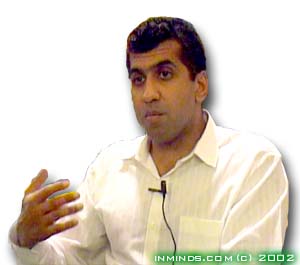
by
Faisal Bodi (Journalist)
Faisal Bodi serves on the
board of advisors to IHRC
and is the editor of UmmahNews.
An informative seminar on how to campaign using the media
- excellent practical advice on how to project our voice,
our concerns across to the media in the most effective manner.
Faisal Bodi takes us systematically through the whole process
starting from identifying who your audience is, what is the
message you are trying to get across and how to best encompass
it in a press release, how to prepare for the interview so
as not to fall in to line with the journalists agenda, etc.
What makes the seminar special is that he uses a real life
example, a campaign he has recently been involved in (Mauritius
Prisoner of Faith) to show how the whole process works
right down to the questions we have to ask ourselves and the
steps we have to go through in thinking through the issues.
Highly recommended.
The 30 minute talk was followed by 15 minutes of questions
and answers.
In reply to a question on independent Muslim media:
"I say this
time and time again that there is no getting round the necessity
for an independent Muslim media. You can have as many voices
as you like penetrating the western media but ultimately they
are serving a different agenda. Unless and until you have
Muslims dominating the mainstream media, in which case it
wont be the mainstream media - it'll be the Muslim media,
you are not going to have the influence in the mainstream
media, you are not going to change peoples minds.
One of the great
advantages of this IT revolution has been the ease with which
people can use the new technologies to relay their voice using
the internet, streaming methods. Somebody told me it costs
about £20,000 to set up a satellite TV station. We are
talking about economies of scale which have come crashing
down in the IT revolution. And ultimately it is going to have
to be the Muslim professional classes, the moneyed Muslims,
who are going to have to support these ventures - okay they
have become cheaper but even a satellite station or a website
is outside the range of one person or a couple of individuals.
The main advantage is that
you get an unadulterated Islamic voice across to people. And
you would be surprised at the number of people, including
non-Muslim, that access Muslim media and alternative media
for their news sources. I run Ummahnews.com, we are not big
- 75,000 hits a week, over the course of 18 months we've had
a trickle of non-Muslim readers who've written back and said
'I don't agree with everything you carry here, some of it
seems outrageous, some of it seems utterly rubbish but its
a very important source of news for me, to get the other perspective
as it were" .
So in order to get the
Muslim perspective across we cant rely solely on the mainstream
media, we have to support the attempts to create an independent
Muslim media in this country - there is no two ways about
it.
Its quiet disheartening
to see that the number one complaint you get every where is
' Oh brother we have no influence in the media, the Muslims
always get rubbished in the media, we're demonised, we have
no journalists, we have no editors, how come when we have
someone on Question Time is Jasmin Alibhai Brown - somebody
whose not one of us?' My response to this is that you have
got to create, you've got to generate your own spokes people,
you know, you've got to strengthen them. And strengthening
actually means supporting people, you know there are lots
of Muslims journalists out there who are lost in the BBC,
lost in the Guardian. They are keeping their head down, they've
almost become west-toxicated - they've conformed because they
need to get on in their career. But had they gone in the Guardian
and the BBC from a position of strength and had a community,
had some bodies behind them, had they known that if they adopt
such and such a position, an anti-war position for instance
or an anti-israel position they would have the support of
the Muslim community and this organisation and that organisation
and have got money behind them so they wouldn't have to worry
about their mortgage being effected or how they are going
to support their families, then these people would be more
inclined to helpful. Muslims need to put their hands in their
pockets and actually fork out and develop their own institutions
- this is the only way..."
|
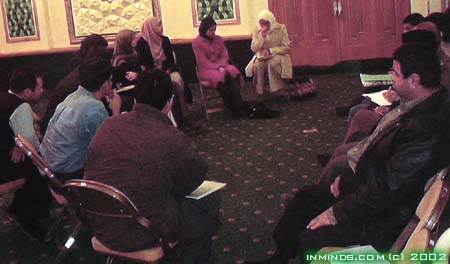
After lunch, parallel workshops were conducted. Each consisting
of a small group discussing a specific area of campaigning. This
one is discussing the problems faced in campaigning for Palestine
on University Campuses. One student reveals that Zionist groups
on his campus recently tried to brand a student seminar on Palestine
as anti-Semitic even though the leading speaker was a Jewish Rabbi
(anti-Zionist)!
|

|
Further
Information
The Islamic Human Rights Commission has members all around
the world, all working together to fight for justice and human
rights. If you would like to become a member of just find
out more about the work IHRC is doing please visit their website
or email them.
|
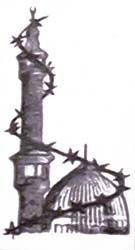
|
|










